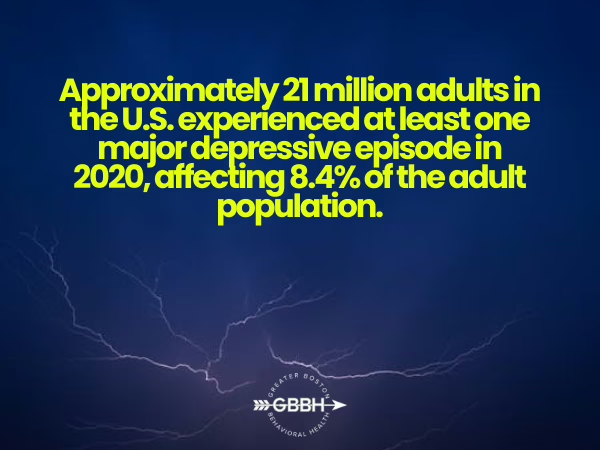Depression is more than just feeling sad or going through a rough patch—it’s a serious mental health condition that can impact every aspect of life. Affecting millions of people each year, depression interferes with emotional well-being, physical health, relationships, and work productivity. For individuals in Boston behavioral health programs, understanding depression’s signs and symptoms is critical to finding the support needed for recovery and wellness.
At Greater Boston Behavioral Health, we provide compassionate care and evidence-based solutions through our Depression Treatment Programs and Mental Health Therapy Programs. This blog explores what depression is, its warning signs, and when to seek professional help.
What Is Depression?
Depression, also known as major depressive disorder (MDD), is a mood disorder characterized by persistent feelings of sadness, hopelessness, and a loss of interest in activities once enjoyed. While everyone experiences occasional sadness, depression is more severe and long-lasting, often affecting thoughts, behaviors, and physical health.
Types of Depression
- Major Depressive Disorder (MDD): Persistent depressive episodes lasting two weeks or longer.
- Persistent Depressive Disorder (PDD): Also called dysthymia, a chronic form of depression lasting two years or more.
- Seasonal Affective Disorder (SAD): Depression linked to changes in seasons, usually occurring during the winter months.
- Postpartum Depression: A severe form of depression experienced after childbirth.
- Bipolar Depression: Depressive episodes as part of bipolar disorder, alternating with manic phases.
Understanding the type of depression an individual is experiencing is essential for developing an effective treatment plan.
Common Signs and Symptoms of Depression
The symptoms of depression can vary widely from person to person, but they typically affect emotional, behavioral, and physical well-being. Recognizing these signs early can make a significant difference in recovery outcomes.
Emotional Symptoms:
- Persistent feelings of sadness, hopelessness, or emptiness.
- Increased irritability or frustration, even over small matters.
- Feelings of guilt, worthlessness, or self-blame.
Behavioral Symptoms:
- Loss of interest in hobbies, social activities, or relationships.
- Difficulty concentrating, making decisions, or remembering details.
- Withdrawing from loved ones or isolating oneself.
Physical Symptoms:
- Fatigue or lack of energy, even after adequate rest.
- Changes in appetite or weight (eating too much or too little).
- Sleep disturbances, such as insomnia or sleeping excessively.
- Physical aches and pains without a clear medical cause.
When to Seek Help
It’s important to understand that depression is treatable, but early intervention is key. If depression symptoms persist for more than two weeks and interfere with daily life, it’s time to seek professional help.
Signs You Should Seek Professional Support:
- Difficulty functioning at work, school, or home due to depression.
- Persistent feelings of hopelessness or despair.
- Suicidal thoughts or self-harm behaviors.
- Co-occurring mental health challenges, such as anxiety or substance use.
At Greater Boston Behavioral Health, we offer a range of treatment options tailored to meet each individual’s needs. Whether through CBT Therapy, DBT Therapy, or other evidence-based interventions, we are here to help you take the first step toward recovery.
The Role of Therapy in Treating Depression
Professional therapy plays a vital role in managing and overcoming depression. At GBBH, we use a combination of therapeutic approaches to address the underlying causes of depression and develop strategies for long-term wellness.
1. Cognitive Behavioral Therapy (CBT):
CBT is a widely used, evidence-based therapy that focuses on identifying and changing negative thought patterns and behaviors.
How CBT Helps:
- Identifies thought distortions that contribute to depression.
- Encourages healthy coping strategies for dealing with stress.
- Helps clients set achievable goals to regain a sense of purpose.
2. Dialectical Behavior Therapy (DBT):
Originally developed for borderline personality disorder, DBT is also highly effective in treating depression, especially for individuals with co-occurring emotional dysregulation.
How DBT Helps:
- Teaches mindfulness skills to increase emotional awareness.
- Builds distress tolerance skills to manage emotional crises.
- Enhances interpersonal effectiveness, improving relationships.
3. Group and Family Therapy:
Support systems are vital for recovery. Group therapy provides a sense of community and shared understanding, while family therapy helps rebuild trust and communication.
How Group and Family Therapy Help:
- Encourages individuals to learn from shared experiences.
- Helps families understand how to support their loved one.
- Builds stronger, more empathetic relationships.
Holistic Approaches to Depression Treatment
In addition to traditional therapies, holistic approaches can enhance emotional and physical well-being, supporting recovery from depression.
1. Exercise and Physical Health:
Exercise boosts endorphin levels, improves sleep, and reduces stress. Even small activities like walking can have a positive impact on mood.
2. Nutrition:
A healthy diet supports brain function and emotional balance. Avoiding processed foods and consuming more whole foods can make a significant difference.
3. Mindfulness and Relaxation Techniques:
Practices like meditation, yoga, or deep breathing help individuals manage stress and develop a stronger connection with their emotions.
Why Choose Greater Boston Behavioral Health?
At Greater Boston Behavioral Health, we take a comprehensive, individualized approach to treating depression. As a trusted Mental Health Treatment Center in Boston, we are dedicated to providing compassionate care that meets the unique needs of each client.
What Sets Us Apart:
- Expert Clinicians: Our team specializes in DBT Therapy, CBT Therapy, and other evidence-based approaches.
- Tailored Treatment Plans: We create customized care plans that address each individual’s challenges and goals.
- Holistic Care: We integrate traditional therapy with holistic approaches to support whole-person wellness.
- Supportive Environment: We provide a safe, judgment-free space for healing and growth.
Conclusion
Depression can feel overwhelming, but you don’t have to face it alone. With the right support and treatment, recovery is possible. At Greater Boston Behavioral Health, we’re here to help you every step of the way.
Contact us today at (888)278-0716 to learn more about our Depression Treatment Programs, Anxiety Treatment Program, and other services. Together, we’ll help you build a brighter, more balanced future.
FAQ: Understanding Depression – Signs, Symptoms, and When to Seek Help
What are the common signs of depression?
Common signs include persistent sadness, fatigue, loss of interest in activities, changes in sleep and appetite, difficulty concentrating, and feelings of hopelessness or worthlessness.
How is depression different from normal sadness?
While sadness is a normal reaction to life’s challenges, depression is a prolonged and severe mental health condition that interferes with daily life and requires professional treatment.
When should I seek help for depression?
Seek help if symptoms persist for more than two weeks, interfere with your ability to function, or if you experience suicidal thoughts or self-harm behaviors.
What treatments are available for depression?
Treatment options include Cognitive Behavioral Therapy (CBT), Dialectical Behavior Therapy (DBT), medication, group therapy, and holistic approaches like mindfulness and exercise.
Does Greater Boston Behavioral Health offer depression treatment?
Yes, we provide comprehensive Depression Treatment Programs, including CBT Therapy, DBT Therapy, and Mental Health Therapy Programs tailored to individual needs.


